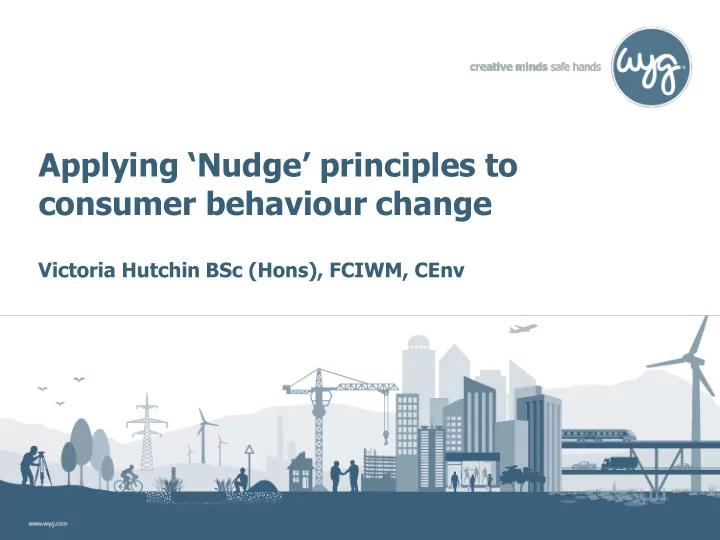

Applying ‘Nudge’ principles to consumer behaviour change Victoria Hutchin BSc (Hons), FCIWM, CEnv
Welcome Associate Waste & Resource Management • Consultant Fellow of CIWM • 35 under 35 Awards winner 2018 and 2019 • Chartered Waste Manager and Chartered • Environmentalist Former LA Recycling Officer • 13 years of sector experience • 1
Who are WYG? WYG is an award-winning professional services firm operating from • more than 50 locations across the UK, Europe, Africa and Asia We serve our clients through six business streams: • – International Development – Infrastructure & Built Environment – Programme & Project Management – Surveying & Asset Management – Environmental • Waste and Resource Management – Planning & Transport https://www.wyg.com/consulting/environmental • 2
Agenda Introduction • Perceptions • Behavioural Insights • Behaviour Examples • The issue with ‘guilt marketing’ • Charges versus discounts • Capitalising on Social Norms • Conclusions • What’s next? • 3
Introduction Emergence of novel marketing techniques • – Grounded in research – Practical evidence – Based on observed human behaviours Understanding why people behave in a certain way • How they are likely to respond to different methods of engagement • 4
Perceptions Public are more accepting of certain types of negative behaviour • The context of the behaviour is important to how serious the incident • is perceived to be People are more likely to do something if they perceive that is what the majority are doing 5
Behavioural Insights Applying psychology • Making techniques more representative of human behaviour • People will naturally behave like most • Behaviours shape attitudes 6
Behaviour examples Reducing conscious ‘effort’ more effective than offering discounts • or other financial savings Evidence of being caught in the act makes people more likely to • respond Laws and punishments are less effective at getting people to start • doing something than stop Campaigns to get people to not do something can prime the brain to • do the opposite 7
The issue with ‘guilt marketing’ Trying to ‘shame’ people into doing the right thing generally • ineffective Fear does not spur people into action • Pressure to buy the ‘right’ things isn’t enough on its own • – Convenience outweighs conscience OR – People feel powerless to act if scale of issue too great 8
Charges versus discounts Charges work better than discounts! Coffee cups – smalls charges more effective than larger discounts • Hubbub example • Take-up 8% 7% 6% 5% 4% 3% 2% 1% 0% 25p Discount 5p Additional charge 9
Charges versus discounts University of Winchester • 100% 90% 80% Non- Reusabl 70% e 60% 50% 40% 30% 20% Reusabl e 10% 0% Cup use Adding a ‘penalty’ to base cost is more effective 10
Social Norms Public shaming changes perception of what is the ‘norm’ • – Fly-tipping campaigns have resulted in increases in incidents If it is a behaviour ‘everyone else’ is doing then people will go along • with that – Telling people what everyone else is doing can change behaviour Smoking ban – not smoking is the new ‘norm’ and is now largely self - • policing 11
Conclusions Increase in the use of psychology in behaviour marketing • The power of conforming to what is socially acceptable has had a • far greater impact than legislation and penalties Charges are more effective than discounts • Use the power of social norms 12
What’s next? Rise of refill • – Not just dedicated refill shops – Waitrose and Morrisons Fresh produce counters • Could bringing your own containers be the norm? Could we see the coffee cup approach to other produce? 13
14
victoria.hutchin@wyg.com If you would like any more information, please visit www. wyg.com
Recommend
More recommend